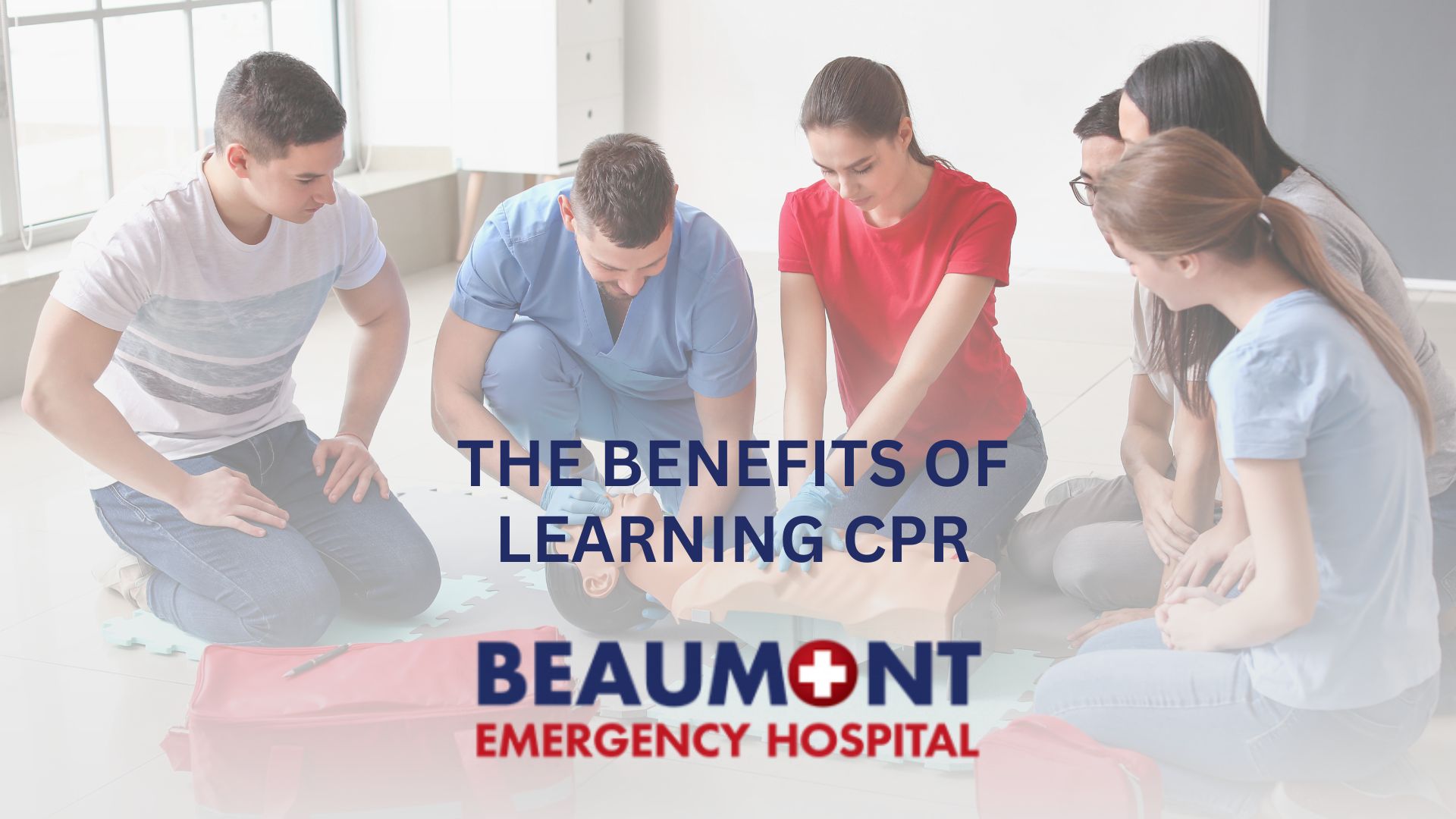
Learning CPR or (cardiopulmonary resuscitation) is a life-saving technique that everyone should consider. Whether you’re caring for an elderly family member, have young children, supervise a child who plays sports, or work as a babysitter or caregiver, knowing how to perform CPR can make the difference between life and death in an emergency. CPR is not just for medical professionals—families in Beaumont can easily learn it and be prepared to act when needed.
What Is CPR?
CPR, or cardiopulmonary resuscitation, is a combination of chest compressions and rescue breaths designed to keep oxygen-rich blood flowing to vital organs when a person’s heart or breathing has stopped. CPR is used in emergencies such as cardiac arrest, choking, drowning, or severe allergic reactions. The goal is to sustain life by maintaining blood circulation and oxygenation until professional help arrives.
According to the American Heart Association (AHA), immediate CPR can double or even triple the chances of survival after cardiac arrest (American Heart Association).
How CPR Works
CPR mimics the heart’s natural pumping action through manual chest compressions, while rescue breaths supply oxygen to the lungs. For adults, compressions are deeper and faster, whereas for children and infants, they are gentler and often involve using two fingers or one hand instead of two. The difference in technique ensures the safety and effectiveness of CPR based on the individual’s size and physical condition.
Who Can Learn CPR?
CPR is accessible to almost anyone willing to learn. In Beaumont, the local chapters of the American Heart Association and the American Red Cross regularly host certification classes for families, caregivers, and individuals:
- Certification Age: Children as young as 12 can typically get certified, but younger children can still participate in informal training.
- Class Length: Most certification classes last about two to four hours and include hands-on practice with mannequins and AED (automated external defibrillator) training.
- Certification Validity: CPR certifications are valid for two years, after which a refresher course is recommended to maintain proficiency.
Local CPR Training Opportunities in Beaumont
Beaumont residents have access to several resources for learning CPR. The American Red Cross Southeast Texas Chapter and the American Heart Association’s regional offices offer both in-person and hybrid training programs.
- American Red Cross Southeast Texas Chapter: Located in Beaumont, this chapter offers comprehensive CPR and first aid courses for individuals and groups. Visit RedCross.org or call their Beaumont office for the latest schedule.
- American Heart Association Southeast Texas Office: The AHA provides CPR training through certified instructors in Beaumont. You can find class options and register at Heart.org or contact their regional office directly.
Why Families Should Learn CPR
Families with elderly relatives, young children, or active athletes are particularly encouraged to learn CPR.
- Elderly Family Members: With heart disease being a leading cause of death, seniors are at greater risk of cardiac arrest. CPR can keep them alive until paramedics arrive.
- Young Children: Infants and toddlers are prone to choking incidents, making infant CPR an invaluable skill for parents and caregivers.
- Sports-Playing Kids: Youth sports participants, though typically healthy, can experience cardiac events from undiagnosed conditions or injuries. Parents and coaches trained in CPR can respond immediately.
- Babysitters and Caregivers: Those supervising children should know how to handle emergencies confidently.
Annual CPR Certification as a New Year’s Resolution
Consider making CPR certification an annual New Year’s tradition for your family, much like spring cleaning or updating your emergency contact information. Regularly reviewing and refreshing your CPR skills ensures you’re always prepared for emergencies.
- Inspect Your Household: Evaluate whether everyone in your family who could encounter an emergency situation is CPR-certified.
- Schedule Training: Book a class through local resources like the American Red Cross, American Heart Association, or a nearby hospital.
- Stay Updated: Mark your calendar for a recertification course every two years.
Beaumont Emergency Hospital: Your Trusted Resource
While CPR is an essential skill that can save lives in an emergency, some situations require immediate professional medical care. Beaumont Emergency Hospital is open 24/7/365, providing expert treatment for life-threatening conditions such as heart attacks and strokes. With state-of-the-art facilities and board-certified emergency physicians, we are ready to handle emergencies when every second counts.
If you or a loved one experiences a cardiac emergency or stroke, contact 911 immediately for professional medical assistance. CPR can buy precious time, but knowing when to seek advanced care is equally important. Make this New Year the one where you equip yourself with the skills to save lives—you never know when they may be needed.
Works Cited
American Heart Association. “CPR Facts and Stats.” Heart.org, https://www.heart.org.
American Red Cross. “CPR Training.” RedCross.org, https://www.redcross.org.
